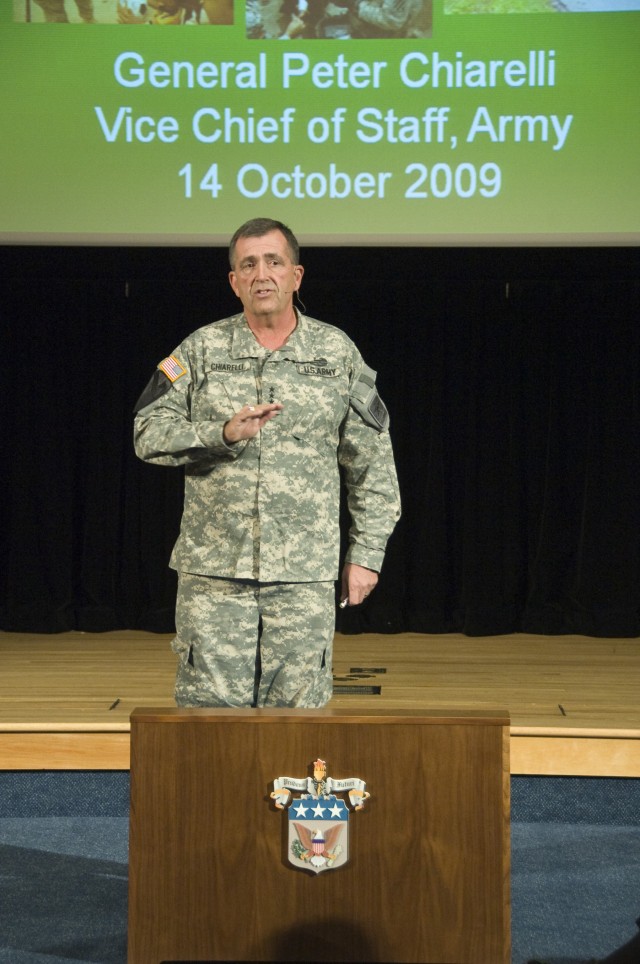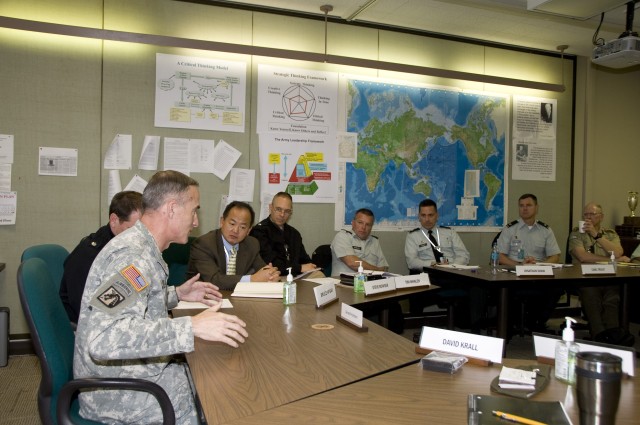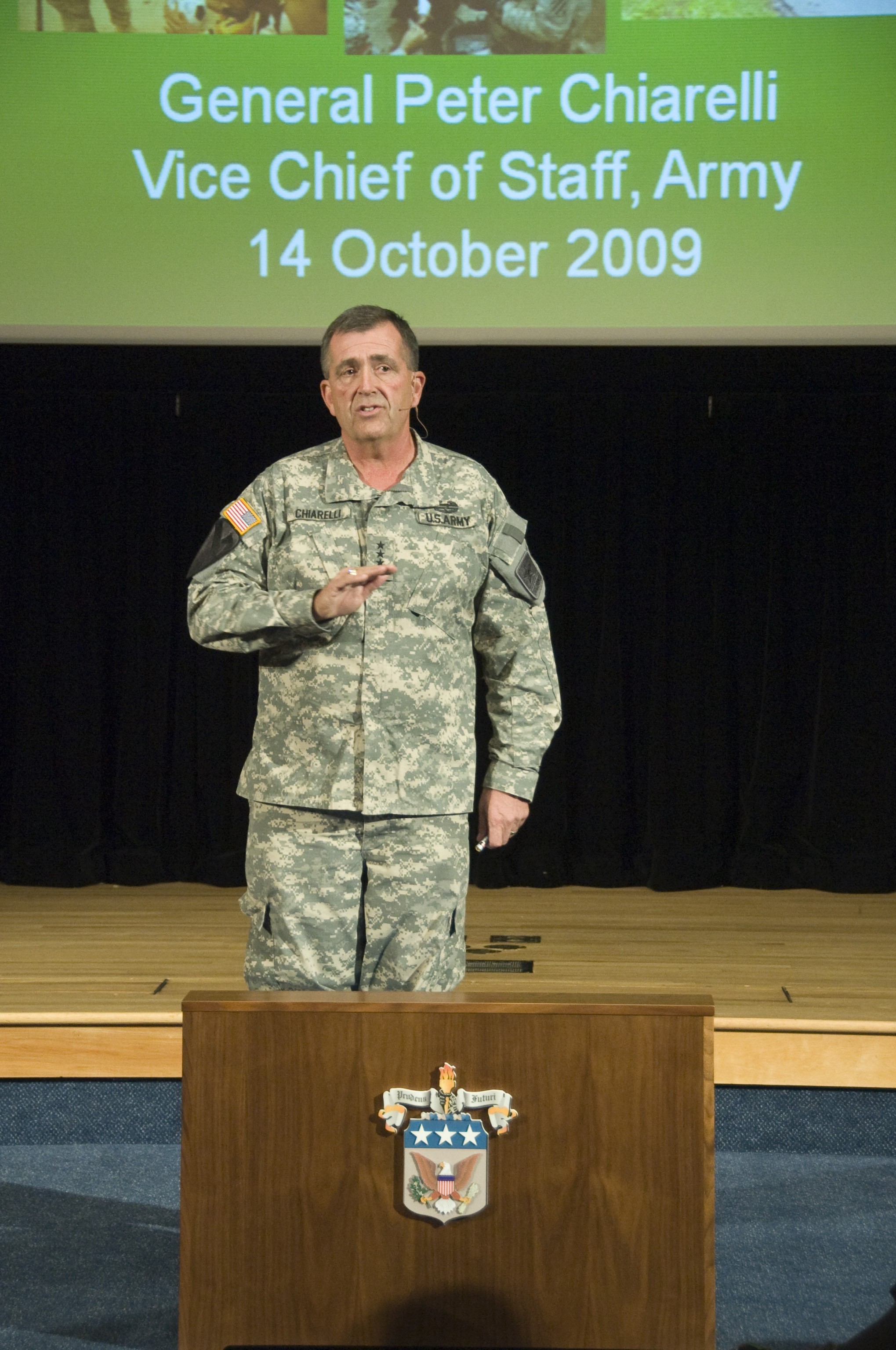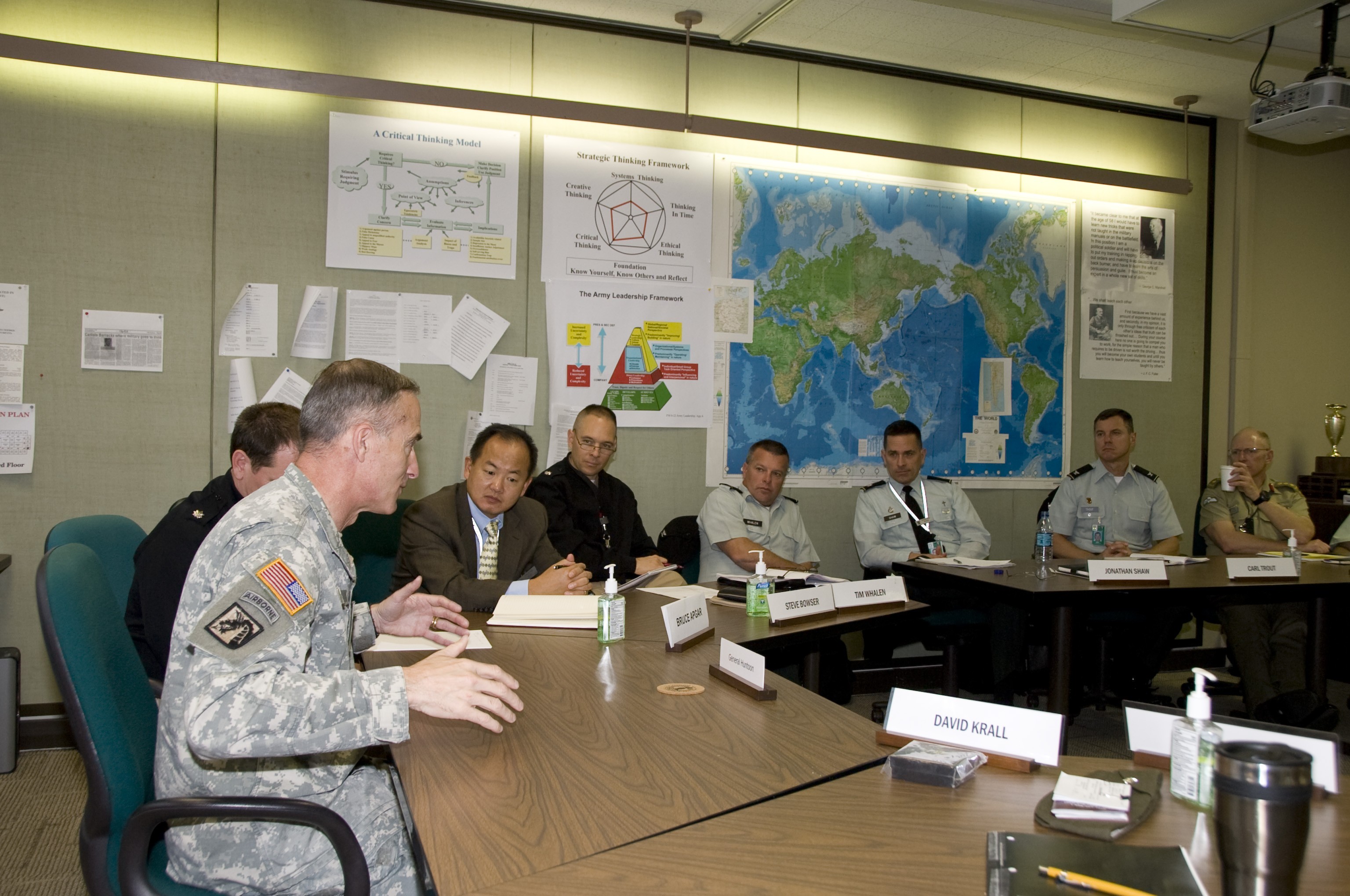Two themes emerged when the Army staff spent a day in conversation with students and faculty of the Army War College: the challenge of adapting to changing nature of warfare and the commitment to the health of Soldiers.
"Warfare has changed forever," said Gen. Peter Chiarelli, Vice Chief of Staff of the Army. "Soldiers and their leaders today must be prepared to operate among the full spectrum of operations at almost a moment's notice."
Chiarelli addressed the class as part of the annual Anton Myrer Army Leader Day, the capstone event for the college's Strategic Leadership course. He described the strategic environment as ever-changing, with more responsibilities for the NCOs and junior officers at the forefront of the fight.
Relationships formed with local leaders are sometimes just as important to the short and long term success of an operation, he said.
"Sometimes these relationships truly make the difference in winning and losing."
The changing nature of battle has also lead to a greater focus on the effects of battle on the Soldiers themselves. A priority for Chiarelli is to tackle programs for post traumatic stress disorder and traumatic brain injuries.
"PTSD and TBI are real. I have seen the effects," he said. "The challenge is how to educate our Army about it." Chiarelli pointed out that the military has implemented many programs to help wounded Soldiers and that the progress must continue.
"Finding a solution is absolutely vital. We have an obligation and commitment to our Soldiers." He pointed out the Army Wounded Warrior program as one step in helping take care of Soldiers who have suffered injuries.
Chiarelli led the "all-star" Army staff, following the formal address, in discussions in each of the 20 seminars about the lessons of leadership.
"Just the fact that the Army staff reached out to Army colonels is insightful and helps us prepare for life after the war college, said Col. Mark Sullivan, student.
Sullivan's seminar explored case of senior-leader communication in a free-form discussion with Col. (P) Lew Boone, deputy chief of Army Public Affairs, testing assumptions about strategic communication, information operations and public affairs. They recognized a gulf between the tactically-oriented information at the brigade or below, and the communication challenges facing strategic leaders.
"At brigade and below we do very well at communicating. Once you reach the strategic level, it becomes increasingly more complicated," concluded Sullivan.
"What is our force going to look like in the future'" and "Are you concerned with the fitness of the force'" asked Maj. Gen. Bernie Champoux, chief, Legislative Liaison, Office of the Secretary of the Army. Champoux, a 1999 Army War College graduate, discussed with frankness an array of topics to include strategic thinking and leadership, the changing dynamics of the military, the civil-military relationship, BRAC, retention in the military, and the don't ask don't tell policy.
Champoux also discussed his position in working with Congress and a new program, Congressional Fellowship Program developed for competitive officers to work in legislative liaison to better understand the relationship between the military and Congress.
"The candor particularly was refreshing," said Marine Lt. Col. Dave Sheehan, student. "It gave us a good insight into the political aspects of the environment that most of us will be in our next job."
Army Surgeon General talks with students
Lt. Gen. Eric Schoomaker, commanding general of the Army Medical Command and Army Surgeon General, spoke to students about the future of the military and finding the talent to staff the medical commands.
Schoomaker started off with a brief reflection about Army surgeon generals, highlighting the progress achieved in creating vaccines that prevented the further spread of diseases such as yellow fever and malaria, and how that mission of preventive measures still stands today.
"One of the pleasures of being in uniform is that my first and most important goal is to keep the force healthy and to help prevent and treat injuries," Schoomaker said.
Navy Cdr. Karlyna Andersen, who works in family practice, agreed with Schoomaker about the challenges in hiring the right people for the job.
"One of the challenges we currently face is the shortage of talent, such as physicians and nurses," she said. "All services face this challenge and the question now is how to deal with this."
Marine Lt. Col. Anthone Wright said the discussion was great given all the recent attention on healthcare.
"The most important issues for me are how we confront healthcare for the next 10 to 15 years and it is good to know that people are already thinking of these things," he said.
Col. Mark Fassl said he found Schoomaker's presentation interesting and that it put the medical command's job in perspective.
"One of the broader aspects of having a population of Soldiers that are being saved on the battlefield more remarkably now than any other time in our past has caused the whole health system to undergo a transformation," he said. "Whether it is the administration of medicine, the structuring of hospitals or the treatment of silent wounds, such as PTSD (post traumatic stress disorder), we now have a different cohort of people to worry about how to treat and that's significant for us. Plus, you have their families."
Director of the Army Staff returns to Carlisle
Lt. Gen. David Huntoon, director of the Army staff, was one of the leaders who took part in the seminar discussions. He spoke with the seminar about the importance of life balance and the need to be an effective communicator. The students asked Huntoon about the challenges of a transition period following a presidential election and how the Army staff works at the Pentagon.
Huntoon also had a message for the students about their time here at the Army War College.
"Take full advantage of your time here," he said. "Take the time to re-balance your life, re-connect with your families. We are in a period of persistent conflict and you will need those skills."




Social Sharing